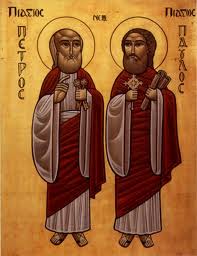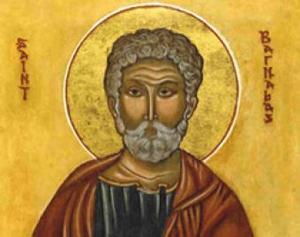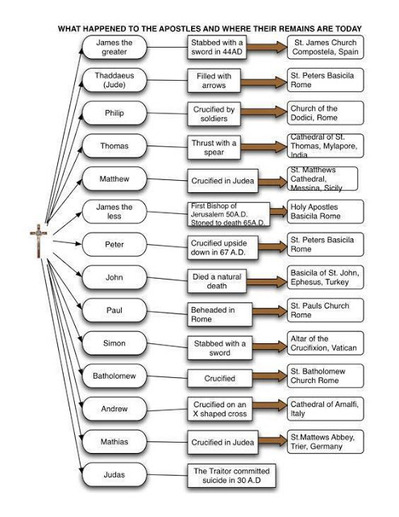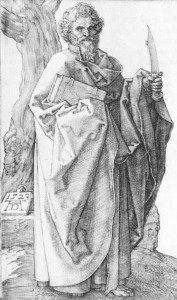 Saint Bartholomew, known also as Nathanael, apostle and martyr, died in AD 71, is liturgically recalled today. However, his feast comes after the Sunday’s precedence. Nonetheless, we need to closely attend to the life and ministry of the 12, those who personally and dramatically lived with the Lord for three years. Why? Because we follow their experience and we continually ask ourselves the key question of the Christian life: “Who are you, Jesus?”
Saint Bartholomew, known also as Nathanael, apostle and martyr, died in AD 71, is liturgically recalled today. However, his feast comes after the Sunday’s precedence. Nonetheless, we need to closely attend to the life and ministry of the 12, those who personally and dramatically lived with the Lord for three years. Why? Because we follow their experience and we continually ask ourselves the key question of the Christian life: “Who are you, Jesus?”
Saint Bartholomew, Bar-Tolmai or son of Tolmai, was one of the twelve Apostles called to the apostolate by our Blessed Lord Himself. His name is more adequately rendered by his given name, Nathanael. If one wonders why the synoptic Gospels always call him Bartholomew, it would be because the name Nathanael in Hebrew is equivalent to that of Matthew, since both in Hebrew signify gift of God; in this way the Evangelists avoided all confusion between the two Apostles. He was a native of Cana in Galilee, a doctor of the Jewish law, and a friend of Philip.
Philip, advised by Peter and Andrew, hastened to communicate to his friend the good news of his discovery of Christ: We have found Him whom Moses in the Law, and the Prophets, wrote! Come and see. Jesus saw Nathanael coming to Him, and said of him, Behold a true Israelite, in whom there is no guile. (Cf. John 1:45-49) His innocence and simplicity of heart deserved to be celebrated with this high praise in the divine mouth of Our Redeemer. And Nathanael, when Jesus told him He had already seen him in a certain place, confessed his faith at once: Rabbi, Thou art the Son of God, Thou art the King of Israel!
Being eminently qualified by divine grace to discharge the functions of an Apostle, he carried the Gospel through the most barbarous countries of the East, penetrating into the remoter Indies, baptizing neophytes and casting out demons. A copy of the Gospel of Saint Matthew was found in India by Saint Pantænus in the third century, taken there, according to local tradition, by Saint Bartholomew. Saint John Chrysostom said the Apostle also preached in Asia Minor and, with Saint Philip, suffered there, though not mortally, for the faith. Saint Bartholomew’s last mission was in Greater Armenia, where, preaching in a place obstinately addicted to the worship of idols, he was crowned with a glorious martyrdom. The modern Greek historians say that he was condemned by the governor of Albanopolis to be crucified. Others affirm that he was flayed alive, which treatment might well have accompanied his crucifixion, this double punishment being in use not only in Egypt, but also among the Persians.
Reflection: The characteristic virtue of the Holy Apostles was zeal for the divine glory. A soldier is always ready to defend the honor of his prince, and a son that of his father; can a Christian say he loves God if he is indifferent to His honor?
Dictionnaire de la Bible, Ed. F. Vigouroux (Letouzey et Ané: Paris, 1912), Vol. 5, Philippe, Apôtre; Little Pictorial Lives of the Saints, a compilation based on Butler’s Lives of the Saints and other sources by John Gilmary Shea (Benziger Brothers: New York, 1894).
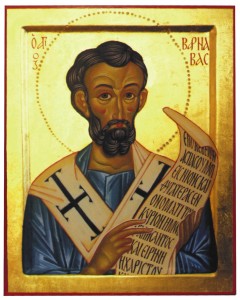 When he converted to Christ from being a Cypriot Jew, Joseph changed his name to Barnabas, a name that means “son of encouragement.” Barnabas seems to be the cousin of John Mark, the author of the Gospel of Mark.
When he converted to Christ from being a Cypriot Jew, Joseph changed his name to Barnabas, a name that means “son of encouragement.” Barnabas seems to be the cousin of John Mark, the author of the Gospel of Mark.
